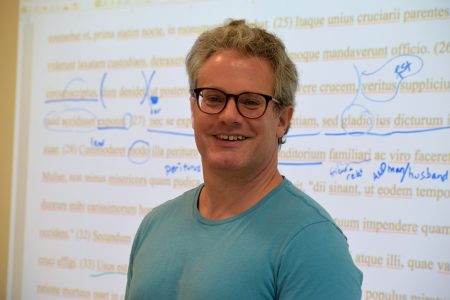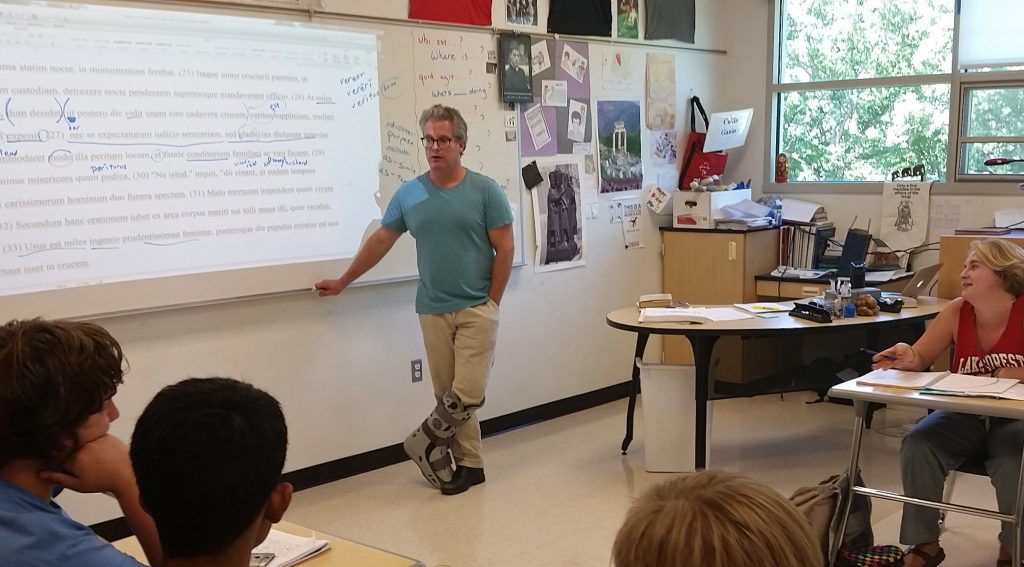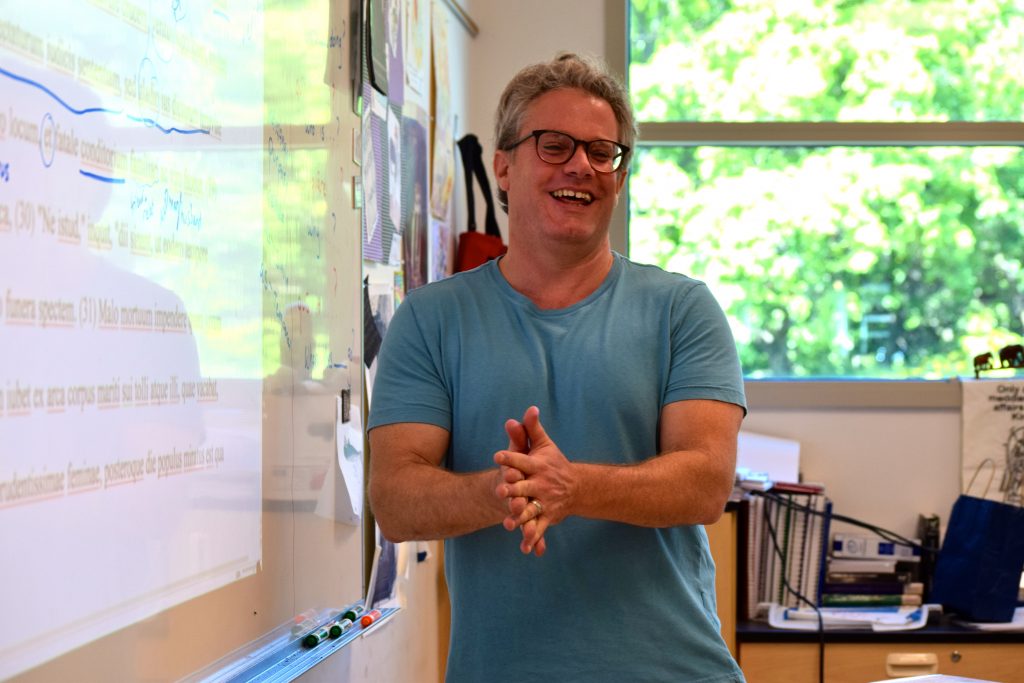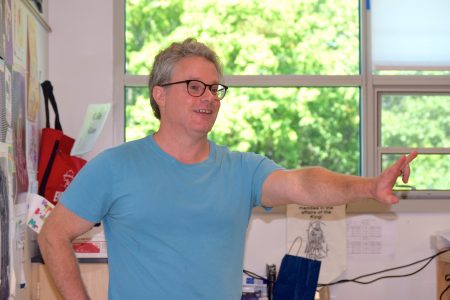

Collin Ganio was born in 1970 and grew up in Walnut Creek, California. His childhood goal was to become a starship captain by his 30th birthday, but at the age of seven, he began to suspect this might not happen. When the cold light of reality dawned, he began to seek more achievable goals.
Ganio received his bachelor’s degree in classical studies from the University of California at Berkeley in 1992. In 1994 he moved to Ann Arbor to continue his studies at the University of Michigan, where he received his master’s degree in classics and worked as an academic editor until 2002, when he began teaching Latin in high school.
Ganio lives in Ann Arbor with his wife Suzanne and cat Flash. He enjoys reading, cycling, weight lifting, gardening, PC gaming, and board games. He also cures his own meat.
Photos and profile by Jo Mathis/AAPS District News
What inspired you to become a teacher? Somewhere along the way I decided that whatever career path I chose had to be helpful to my community, not just to myself or to select individuals. My father, who taught middle school math, told me that he enjoyed helping his students improve their minds. He found it fulfilling to lift people up and push them higher to the next level—to help them develop the tools to become successful. The idea that I could do that too has always stuck with me, and is now my primary motivation as a teacher.

Why Latin? Latin helps you develop a vocabulary that goes beyond the standard, pedestrian terminology of everyday English. In the short term, this enhanced vocabulary can be of enormous benefit on standardized tests. In the long term, it enables you to grapple successfully with professional-level writing in just about any field—not just law and medicine, which are so often mentioned in relation to Latin.
More importantly, Latin develops your ability to communicate. We all know bad writing when we see it—although not everyone can say why something is poorly written. Weak writing weakens your argument. Strong writing strengthens your argument. It’s that simple. When we read a poorly written email, memo, or any sort of document, it can undermine our faith in the author’s abilities. The ability to write well has never hurt anyone. But an inability to write well often leads to confusion and miscommunication.
Finally, and most importantly, studying Latin increases our ability to think both logically and creatively at the same time. Critical thinking and creativity are absolutely necessary for real success in life. They always have been, and they always will be. Too many students seem to think they can do one, but not the other. Studying Latin trains them to do both, and to do both well.
What was your plan B? This is my plan B. Plan A was to be a starship captain. If NASA hadn’t spent so much money on milk runs to the space station, and if the government hadn’t curtailed spending on the space program, I would probably be captain right now. Maybe even a fleet admiral. Although, if I were an admiral, I’d probably be thinking how much more fun it was to be a captain.
There is no plan C.

Describe an average workday. I’m awake by 5:15 every morning, and usually out of bed by 5:30. I try to get to school by 6:45, so I can have a little quiet time to work without interruptions. I see my first students at 7:30. A full teaching load at Skyline is four 72-minute classes per day, with one prep hour. My prep is in the middle of the day, attached to both lunch periods, and I’ve usually got students in my room looking for some extra help at that point. So I teach the first two hours of the day; tutor students in the middle, hopefully having some time to grade, send emails, or work on curriculum; and then I teach the last two hours of the day. Once the students leave, I continue whatever grading, lesson planning, and emailing I didn’t get to earlier. Sometimes I have students in for some after-school help. I leave the building around 3:30 or 4:00, and usually take some work home on weekdays. I also often have 4-5 hours of work on the weekends. When I was new to teaching, it was more than that.
What’s the most important thing you’ve learned about teaching? About learning? For a teacher, deep knowledge of your content area is important, but equally critical is a broad knowledge base that will allow a teacher to make connections among various subjects. And all of this knowledge can be useless if a teacher can’t build a good relationship with his or her students. It’s been useful for me to have a thick skin, a quick wit, and a forgiving personality.
For a learner, it’s important to remember that your education is only worth the amount of energy you’re willing to devote to it. If you spend four years in high school saying “This is useless. When am I going to need this?” then yes—you may well find that your time has not been well-spent.
In high school, I never asked “Will this be on the test? When will I need to use this?” I just said to myself “I’m going to learn this.” And I did well enough in high school that I did not have to spend money to attend college. Then I did well enough in college that I did not have to spend money on graduate school. Adjusting to today’s college tuition and fees rates, the growth mindset I maintained in high school was worth over $290,000 to me. And bear in mind that I’m only talking about college and graduate school tuition and fees. I’m not accounting for post-college earning potential or even the inestimable value of being an intelligent, well-educated member of society.
Which apps and websites would you recommend to other teachers? Any social media that allow you to keep in touch with students after they graduate.
I also really like www.etymonline.com. When students ask me for the derivation of a word, I can usually give them a good answer off the top of my own head. But for those moments when I draw a blank, this website is great. It tells you the history of a word, what languages it can be traced to, and when it came into use in English. I especially love the site’s entry for the word micturition and its relationship to the ending of Peter Jackson’s “The Return of the King.”

How do you stay organized? I don’t. The odds are good that at any given moment I’m the most confused person in a room. In all seriousness, my iPhone is where it’s all at. Notes to myself about students, grocery lists, my calendar—everything’s there.
What is unique about teaching at Skyline High School? I don’t think this is necessarily unique to Skyline, but here I’ve got to give a shout out to my colleagues. I personally have found the faculty, staff, and administrators to be very generous with ideas, materials, and advice whenever I’ve needed help. I know exactly who to go to whenever I’m stuck or confused—which is the case more often than not.
What is the most rewarding part of teaching? Building relationships with students and their parents. As a Latin teacher, I’m very privileged in this respect. Students who want to take Latin for more than 1 trimester are stuck with me. There’s no one else at Skyline who teaches it. So when students have been in my classroom for three or four years, we know each other very well. We talk about any number of things beyond Latin, beyond school. Unfortunately, this means I often feel pretty low in late May and early June as my seniors get ready to leave. I can tear up. My last day with seniors is never an easy one. I have a hard time reconciling my excitement for them with my own selfish sorrow at their leaving.
So thank God for social media, huh? I’ve been able to keep in touch with students over the years, and it’s amazing. There’s this one “kid” I’ve known since he was eleven. He’s now in his mid-twenties. We try to get together every summer. It doesn’t always work out, but it’s like the intervening years simply disappear when we do. My former students are now doctors, veterinarians, social activists, nurses, lawyers, mechanics, teachers, and CEO’s of west coast tech start-ups. Some are studying linguistics, Islamic art, business, history, engineering. It’s been great to keep in touch with them.
What do you most remember about being in high school Latin class? My high school didn’t offer Latin. I didn’t realize you could make a career out of it until I got to college. Sadly, I do remember making fun of a good friend of mine who was taking Latin at his private high school.
What was always written on your report card in grade school? “Handwriting needs improvement: C-.” Yes. I was graded on handwriting.
What has surprised you most about the profession? I’m not sure. Having had a father who taught, I came into the profession with eyes wide open about the realities of teaching.
I am often surprised about how kind, forgiving, and understanding my students are if I’m having a rough day. I certainly don’t remember feeling that way about my own teachers when I was in high school. Maybe it’s a generational thing. Or maybe I was just a jerk back then.
What do you wish everyone realized about the work of a teacher? That we’re not automatically on vacation just because students are. I frequently work through holiday breaks, and spend a good deal of time developing curriculum for my classes. I definitely spent much more time on this sort of stuff when I first started. But teaching about ancient literature, art, sports, philosophy, mythology, socio-political and military history—to name a few topics—means that I still need to stay on top of research in these various areas, and that research takes place during the summer or over breaks.
If you could change one thing about public education, what would it be? In some ways, this is an unfair question. There are so many things that need fixing, and it’s hard to just pick one and say “Fix this before anything else.”
That being said, one thing I’d like to fix is how public schools are funded. Schools in wealthy communities end up providing more resources and opportunities to their students, while students in poor communities lag further and further behind. It leads to a situation where the rich get richer and the poor get the picture—to quote “Midnight Oil.”
What would you tell a college student considering becoming a teacher? Think hard about this. Right now, the way so many states prioritize profit above education, you have to love the work.
What do you like to do when you’re not working? I love cycling. It’s such great exercise and if you can find a good, well-maintained road with low traffic in good weather it’s just incredible. I get out there under the sun, I hit my cadence, and the stressors disappear. My world becomes my breath, my rhythm, the road, and the scenery. Oftentimes, a song pops into my head as I ride. I have little control over what song starts playing, and it will loop for as many as 20 or 30 miles. It’s wonderful when the song fits your pace—“Night Shift” is always great for me—but it’s really annoying if it’s something like “Baby Got Back.”

Mr. Ganio is an amazing teacher! He’s fun, engaging, interesting, and smart. His classes show that Latin is very much alive and extremely useful, and his energy and humor have created a loyal following at Skyline. We feel so fortunate to know him!
I didn’t have Mr. Ganio as a teacher, but I was a part of a student organization that he advised, JSA. Mr. Ganio is a wonderful teacher who emphasizes and supports the pursuit of learning of his students. I am glad that he is getting the recognition he deserves.
Collin is an excellent teacher. I know my son loved going to latin class because Collin brought to life the language and knows how to engage the students. He is one of Skyline’s gems!